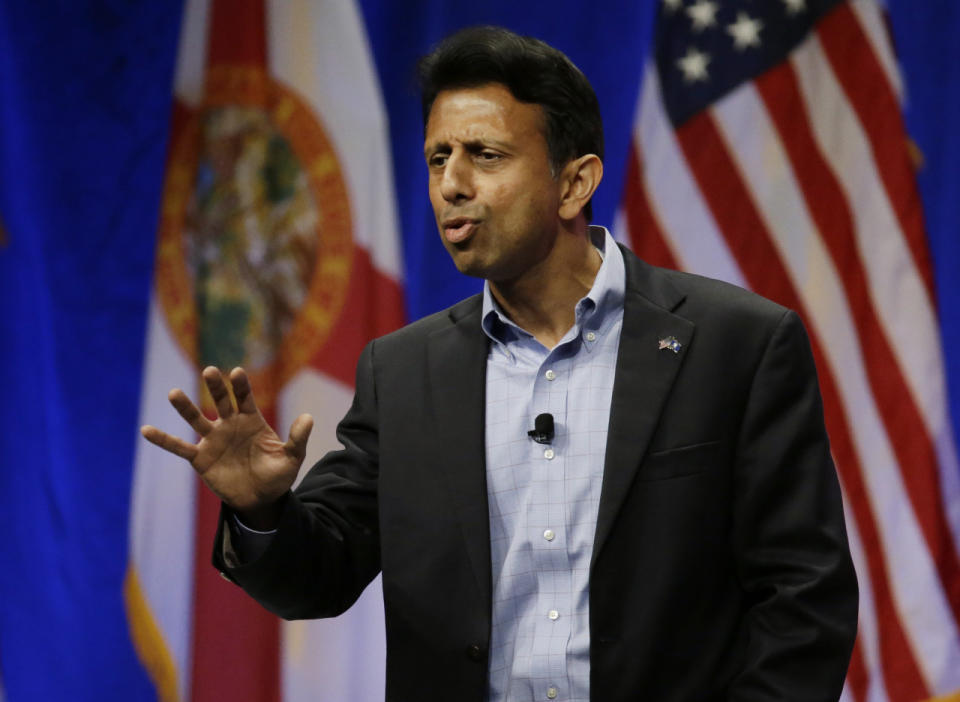Can governors legally reject Syrian refugees?

A Syrian man kisses his daughter shortly after disembarking from a dinghy at a beach on the Greek island of Lesbos, after crossing the Aegean Sea from the Turkish coast on Monday. (Photo: Santi Palacios/AP)
At least 27 governors, all but one of them Republican, have vowed not to accept any refugees from Syria into their states in response to the revelation that one of the Paris terrorists may have entered Europe as part of a wave of migrants from the war-torn region. The move complicates the Obama administration’s plan to accept 10,000 Syrians into the country over the next year.
“I will not stand complicit to a policy that places the citizens of Alabama in harm’s way,” Gov. Robert Bentley of Alabama announced Monday. Georgia Gov. Nathan Deal also refused to accept any more refugees and demanded that the Obama administration “confirm the identities” of 59 Syrians recently settled in his state. The governors of Indiana, Michigan, Arkansas, Texas, and many other states also stated their opposition to accepting Syrian refugees. Meanwhile, presidential candidates Jeb Bush and Ted Cruz have suggested that only Christians from the region should be granted refuge.
“That’s shameful. That’s not American, it’s not who we are,“ President Obama responded Monday.
These governors are likely standing on shaky ground, as there is no legal way for them to prevent refugee resettlement, according to multiple experts. And their opposition is largely symbolic, since once Syrians (or any refugees) are in the U.S., they have the right to travel anywhere they want, just like any other resident. If the Obama administration wanted to challenge these governors on their threats, they would handily beat them in court, experts say.

Republican presidential candidate and Louisiana Gov. Bobby Jindal addresses the Sunshine Summit in Orlando on Saturday. (Photo: John Raoux/AP)
Lavinia Limon, former director of the U.S. Office of Refugee Resettlement under President Bill Clinton, said these governors misunderstand the Constitution.
“It’s really a question of fundamental freedoms,” Limon said. “If you’re legally residing in the United States, you have the right to move wherever you wish to. We could resettle a refugee in New York City today, and tomorrow they could decide to move to Dallas.”
But that might not matter. Refugee resettlement involves the coordination of local nonprofits and government officials with federal agencies, and forcing newly arrived legal residents into communities that don’t want them likely sounds unappealing to everyone involved.
“My suspicion is that if a state was firmly opposed to having Syrian refugees in their borders then as an initial matter, the government might choose to put them somewhere else,” said Jack Chin, a law professor at the University of California at Davis. “Why fight that fight?”
State Department spokesman Mark Toner’s muted reaction to the governors’ threats on Monday seemed to confirm that suspicion. Toner told reporters Monday that the department’s lawyers were reviewing the question of whether governors could refuse to settle Syrian refugees. He struck a conciliatory note, saying he understood the governors’ concerns but reassuring them that the department’s security vetting of Syrian refugees was thorough.
“Our approach to this is: You have concerns? Let’s have a dialogue. Let’s try to address those concerns, alleviate those concerns,” Toner said.
Limon asked how governors would follow through on their threats, if the government did choose to ignore them.
“What are they going to do? Send state marshals to the airports?” she asked.
The image of a Syrian family being forcibly marched across state lines would not be a winning one.
Still, the governors’ moves put pressure on Obama, who has pledged to resettle 10,000 Syrians over the next year. This is less than 1 percent of the more than 4 million people who have fled the country, most of them women and children.
The power to set refugee policy was granted to the State Department and the White House through the United States Refugee Act of 1980. So far, this right has gone largely unchallenged by states.
“I don’t know of any case law that would precede this where a state has said no, and the federal government had to exercise its power through a lawsuit,” said Westy Egmont, a professor specializing in immigration at Boston College. “I do not think it’s been tested.”

A migrant family waits to register with police at a refugee center in the southern Serbian town of Presevo. (Photo: Darko Vojinovic/AP)
Occasionally, federal officials work with local politicians who express concerns about the number of refugees in their state to come to a resolution. Gov. Deal of Georgia had asked for a moratorium on refugees a couple of years ago because he felt there were not enough jobs for native Georgians. The federal government paused the refugee flow and addressed Deal’s concerns, and eventually he agreed to accept refugees again.
But Limon said this situation is different.
“We don’t allow people to dictate on the basis of race, religion or ethnicity about who comes to the community,” she said.
If governors wanted to legally deny entry to Syrians, Congress would have to change the law and specifically exclude Syrians from the refugee program for foreign policy reasons. This would most likely be deemed constitutional, according to Chin.
The Senate is scheduled to vote on legislation banning so-called sanctuary cities this week — a measure pushed by Sen. Ted Cruz — and it’s possible that Syrian refugees will get brought up as part of the larger debate on that immigration issue. Still, it’s hard to imagine that such a move would pass the Senate, much less be signed into law by Obama.


